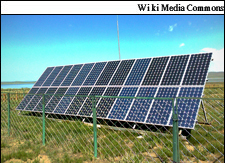While the Indian Solar Manufacturers’ Association, which represents 25 domestic solar manufacturers, has expressed satisfaction over the recent decision of the Directorate General of Anti-Dumping and Allied Duties, Ministry of Commerce, recommending anti-dumping duty on solar modules, panels and glass exported from USA, China, Malaysia and Taiwan, the Ministry of New and Renewable Energy continues to voice its opposition to any such measure on the ground that a large number of projects in the pipeline may get affected.
The anti-dumping duty recommended by the Directorate General of Anti-Dumping and Allied Duties ranges from 11 cents per watt peak to a maximum of 81 cents per watt peak.
Many in the industry including solar energy experts share MNRE’s view and caution that imposing the anti-dumping duty, primarily aimed at protecting domestic solar manufacturers from predatory trade practices, may do more harm than good.
Acc ording to Bridge To India, a company engaged in providing strategic consulting, market intelligence and project development services in the Indian solar market, imposing anti-dumping duty would make solar power expensive by at least 70 paisa per kWh and up to 1 GW of existing projects could get scrapped setting the country’s solar market back by two years.
ording to Bridge To India, a company engaged in providing strategic consulting, market intelligence and project development services in the Indian solar market, imposing anti-dumping duty would make solar power expensive by at least 70 paisa per kWh and up to 1 GW of existing projects could get scrapped setting the country’s solar market back by two years.
The company in its blog said that imposing anti-dumping duty would benefit only three to five Indian solar cell manufacturers in the short term while being detrimental to the country’s larger energy, investment, development and growth story. In the long term, all the solar manufacturers would be hit by a decline in demand for solar, it said.
Elaborating on the other repercussions of the anti-dumping duty, the company said domestic module manufacturers who were almost entirely dependent on cell imports, mainly from China, would find it difficult to sell within the country. Besides, the Indian manufacturers could be subjected to similar retaliatory measures in export markets. Investor confidence in the Indian market would also get affected as a result, it added.
ISMA, on whose application the Directorate General of Anti-Dumping and Allied Duties initiated anti-dumping investigations and subsequently recommended anti-dumping duty, said the measure would revive India’s solar manufacturing. It claimed that import of solar products into the country last year totalled `6,000 crore but Indian manufacturers did not get even 2 per cent of that business.
The final decision with regard to imposition of the anti-dumping duty recommended by the Directorate General of Anti-Dumping and Allied Duties rests with the Ministry of Finance.











